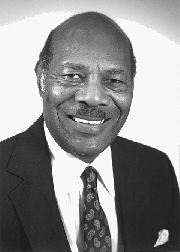Clarence W. Blount facts for kids
Quick facts for kids
Clarence W. Blount
|
|
|---|---|
 |
|
| Member of the Maryland Senate from the 41st district |
|
| In office January 11, 1971 – January 8, 2003 |
|
| Succeeded by | Lisa Gladden |
| Constituency | Baltimore City |
| Personal details | |
| Born | April 20, 1921 |
| Died | April 12, 2003 (aged 81) Baltimore, Maryland |
| Resting place | Woodlawn Cemetery 38°53′6″N 76°56′19″W / 38.88500°N 76.93861°W |
| Political party | Democratic |
| Residences | Baltimore, Maryland |
| Occupation | principal, teacher, mentor |
Clarence W. Blount (April 20, 1921 – April 12, 2003) was an American politician. He made history as the first African American to become the majority leader of the Maryland State Senate. He represented the 41st district in Baltimore City from January 11, 1971, until January 8, 2003.
Contents
Clarence Blount's Early Life and Education
Clarence Blount was born in South Creek, North Carolina. His parents were Lottie and Charles Johnson Blount Sr. He was one of four children. As a boy, Blount helped his father work on a tobacco farm. His family was very poor and could not afford shoes for their children.
When Blount was five years old, his mother died. His family then moved to Baltimore during the Great Depression. This was a time when many people faced serious economic hardship. Blount grew up in the 400 block of North Carey Street. He did not start school until he was 10 years old, after his family moved to Baltimore.
Blount's Schooling and Military Service
Clarence Blount attended public schools in Baltimore City. He graduated from Douglass High School. After high school, he decided to go to college. One month after starting at Morgan State College, he was drafted into the United States Army. At that time, the army was segregated, meaning Black and white soldiers were kept in separate units.
Blount fought in World War II. He served bravely in Italy as part of the all-Black Buffalo Division of the 92nd Infantry. He showed great courage by removing mines from a river passage. This earned him a special promotion on the battlefield. After fighting for his country and against unfair Jim Crow rules, Blount returned to Morgan State in 1946. He graduated in 1950 with a degree in political science.
Later, Blount continued his education at The Johns Hopkins University. He earned another degree in 1965. Before entering politics, Clarence Blount worked as a principal and teacher at Dunbar High School. He also served as an executive assistant at the Community College of Baltimore.
Entering the World of Politics
Blount began his political career in the early 1970s. He became a member of the Democratic National Committee. This group helps guide the Democratic Party. He was also a delegate to the Democratic Party National Convention several times. He attended in 1988, 1992, 1996, and 2000.
Clarence Blount's Time in the Maryland Legislature
In 1970, Clarence Blount was elected to the Maryland State Senate. He represented Maryland's 41st district, which is entirely within Baltimore City. A state senator helps make laws for their state.
In 1983, the Senate President, Thomas V. Miller Jr., chose Blount to be the Majority Leader of the Maryland Senate. This was a very important role. It made him the first African American to hold this position. He kept this leadership role until he left office in 2003.
Key Roles and Achievements
In 1987, Blount became the first Black chairman of a Senate committee. This was the Economic and Environmental Affairs Committee. Because of his calm manner and his background as an educator and veteran, people called him "The Conscience of the Senate." This nickname showed how much people respected his wisdom and fairness.
He also served on many other important committees, including:
- Judicial Proceedings Committee, 1971–1974
- Vice-Chair, Budget and Taxation Committee, 1975–1986
- Member, Executive Nominations Committee, 1975–2003
- Legislative Policy Committee, 1979–2003
- Rules Committee, 1983–2003
- Joint Committee on Children, Youth, and Families, 1999–2003
- Senate Chair, Joint Committee on the Port of Baltimore, 2000–2003
From 1984 to 1986, Blount was elected chairman of the Legislative Black Caucus of Maryland. This group works to address issues important to African American communities.
Blount played a key role in 1997 when the state took over the Baltimore school system. He gave an important speech that helped pass a law. This law provided millions of dollars to the schools. In return, it brought in new ways to manage the system and gave the state a role in running it.
On July 6, 2002, Blount announced that he would not run for re-election.
The "Clarence Blount Rule"
In 1998, another politician, Frank Boston, filed a lawsuit against Blount. Boston claimed that Blount did not live in the district he represented. This would mean Blount could not run for office there. Blount had an apartment in the district, but his main home was outside of it.
The case went to court. A judge first ruled that Blount was not eligible to run. However, Blount appealed this decision. The Maryland Court of Appeals, a higher court, then ruled in Blount's favor. They said that a politician's "domicile" (where they are legally considered to live) is not always the same as their main home. This decision became known as the "Clarence Blount rule."
In 2022, a new bill was passed to change this rule. It will let voters decide if the state constitution should be updated. The change would require candidates to live in their district for at least six months before an election.
Clarence Blount's Lasting Legacy
Clarence W. Blount passed away on April 12, 2003, at the age of 81. He died from complications after a stroke. Many people attended his memorial services at Morgan State University. Important leaders, including U.S. Senator Paul Sarbanes and U.S. Representatives Ben Cardin and Elijah Cummings, spoke about his life and impact.
After his funeral, Blount was laid to rest in Woodlawn Cemetery. U.S. Representative Elijah Cummings honored Blount in a speech. He said that Blount believed his life was meant to help others. Cummings described him as a humble and caring person who worked to uplift other human beings.
To honor his memory, the Clarence W. Blount Towers on the campus of Morgan State University were named after him.
 | Emma Amos |
 | Edward Mitchell Bannister |
 | Larry D. Alexander |
 | Ernie Barnes |


